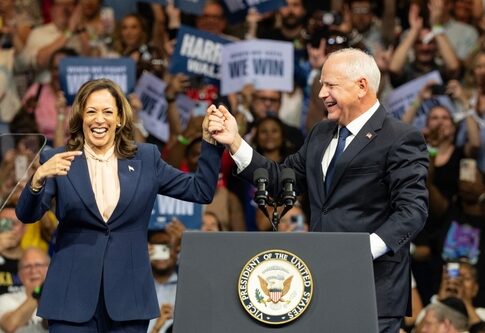Vice President Kamala Harris has reluctantly accepted the use of muted microphones in her upcoming debate with former President Donald Trump, marking a strategic loss for her campaign. Initially, Harris' team had pushed for open microphones throughout the event to engage more directly with Trump's often combative style. However, ABC News rejected the request, citing existing protocols. Trump's team opposed any changes, leaving Harris to adapt to a format that may limit her ability to counter Trump's interruptions and assert dominance.
This development highlights the complexities and high stakes surrounding the debate, scheduled as part of the 2024 presidential campaign season. For Harris, this debate offers a crucial opportunity to position herself as a formidable opponent to Trump, whose aggressive debate style has, in the past, posed a challenge to his rivals.
BREAKING NEWS: Vice President Kamala Harris has agreed to the rules of the upcoming debate with Donald Trump, but said in a letter that she would be “fundamentally disadvantaged” by the debate’s format which will mute Trump’s mic when it’s her turn to speak. + pic.twitter.com/C2DEzF0z8q
— Watering Hole Media (@wateringholemed) September 5, 2024
The Harris campaign’s insistence on open microphones was rooted in a desire for more dynamic exchanges during the debate. According to sources, Harris’ team viewed the direct engagement with Trump as a chance to expose his rhetoric in real-time, countering his frequent tendency to dominate conversations through interruptions and verbal aggression. With muted microphones, however, Harris will be forced to adhere more strictly to the format, which could restrict her ability to challenge Trump’s claims as he makes them.
Trump, on the other hand, was adamant about maintaining the status quo. His team did not want any deviations from the previously agreed-upon debate format, which included the muting mechanism. Trump has thrived in high-conflict debate environments, utilizing interruptions to unsettle his opponents, and his team likely saw the muted microphone policy as a tool that would still benefit his approach by limiting the flow of exchanges.
The big problem for Harris:
After the last weeks events with the gold star families, hamas executions, and horrible CNN interview, the biggest problem for her of them all is losing the fight to change the microphone rules in the debate.
See, because she cant have an open mic to… pic.twitter.com/wnGx5bhSE8— Evan Dyer (@EvanLeeDyer) September 4, 2024
The debate rules now represent a significant shift in how Harris must approach the event. With microphones being muted while the other candidate speaks, Harris’ strategy will need to focus on delivering concise and impactful statements during her allotted time. The loss of spontaneous rebuttals could play to Trump’s advantage, especially given his ability to command attention and sway large audiences with his bold rhetoric.
For Harris, the debate is not only about presenting her vision for the country but also proving she can stand toe-to-toe with a figure as polarizing and influential as Trump. Many political analysts have pointed out that this debate will serve as a litmus test for Harris’ ability to energize the Democratic base and expand her appeal beyond it.
Despite the setback, Harris is expected to lean on her experience as a seasoned debater. Her background as a former prosecutor gives her the tools to engage effectively in high-pressure situations, and her campaign will likely look to frame the muting mechanism as a way to focus on the substance of her policies over Trump’s showmanship.
For Trump, the muted microphones may represent both a challenge and an opportunity. While he has used interruptions effectively in past debates, the format change could force him to deliver more disciplined remarks. His ability to rally his base with strong, decisive statements is well-documented, and he will likely continue to lean into his populist messaging during the debate.

